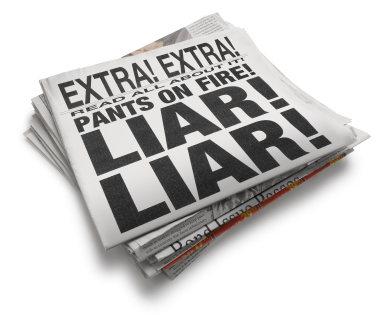“I’m not upset that you lied to me, I’m upset that from now on I can’t believe you.”
– Friedrich Nietzsche
It seems like every few months, some high profile figure makes the headlines for some sort of lie. The recent person of interest was Yahoo’s (now ex) CEO Scott Thompson who listed a non-existent Computer Science degree from Stonehill College on his resume. His subsequent explanations – “It was an inadvertent error, I never read my internet bios.” – only served to fan the flames of skepticism and anger.
We all lie for different reasons. To protect someone’s feelings. To avoid embarrassment. To get away with something we shouldn’t have been doing in the first place. It’s easy for us to read stories like Thompson’s and snicker, saying things like “How could he be so stupid?” or “I’d never do something like that.” We shouldn’t be so arrogant. Everyone is prone to poor decision-making and lapses in judgment. I’ve seen co-workers lose their jobs for far less indiscretions. One 20-year employee was fired because he submitted a reimbursement request for an expense that never occurred. Another was let go because she lied to our vice president about something that (in her mind) was minor.
Unless you’re a habitual liar or have no problem with lying to others, I think most people try to be honest. But sometimes, our lies play out like an often-used Three’s Company sitcom plot:
* Jack tells small lie
* Lie begins to snowball
* Chrissy and Janet find out the truth
* Jack is caught in embarrassing situation and apologizes
The only problem is that there is no laugh track or big group hug at the end. In real life, the main character (you) often pays the price in very real consequences: broken relationships, job loss, public humiliation, loss of reputation, and lingering questions about your character and integrity are just some of the fallout from a simple lie. I doubt if Thompson ever thought this small inaccuracy would come back to haunt him. Another good example is that of George O’Leary, who held (and lost) one of the most prestigious positions in sports – head football coach at the University of Notre Dame. O’Leary claimed he had a graduate degree and played college football. Or Marilee Jones, the celebrated Dean of Admissions for the Massachusetts Institute of Technology (M.I.T.) who ended her 28-year career after it was found she fabricated her own educational credentials.
Lying is a powerful tool because it can get us what we desire. The new house. Fat promotion. Exciting affair. We all know people (maybe even ourselves) who have lied to get what they wanted. But at what price? We should always be vigilant with our thoughts, actions, and motivation. If you start down the path of dishonesty, think about the following:
Who will suffer? Your spouse? The children? Parents? Close friends? Colleagues you’ve mentored and who consider you their role model? Your church community? Maybe all of the above?
Am I willing to live under constant pressure? When you’ve lied, you’re on full alert and constantly looking over your shoulder. Your wife looks at you in a funny way. The boss calls you into his office. The phone rings. Co-workers are whispering in their cubicle. It’s full on paranoia time. Everything ties back to your lie and the thought of “Do they know?” and “Oh no, I’ve been caught.” Do you really want to live your life this way?
Am I ready to pay the price? All of our actions have consequences. In getting what you want, are you prepared to face the possibility that you may lose your family, job, reputation, friends and anything else as a result of your lie? Think about the people you know who have been caught lying. What was the outcome? Take those results and…
Be afraid. Be very afraid. In my own life, I call this the “Scared Straight” way of learning (after the famous 1978 documentary). Scared because: a) I don’t want to end up like that guy; and b) I don’t want to lose things like that guy. This is what I consider life’s warnings. After seeing the aftermath of infidelity and DUI arrests of people that I know and work with, I am too scared to even think about having an affair or driving under the influence. Fear can be a very powerful tool if used correctly.
When was the last time you lied and what were the consequences?

